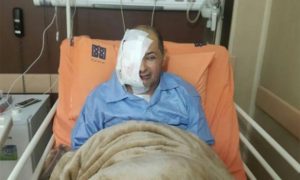

By The Guardian 8 September 2017 : A prominent Iranian journalist has lost an eye and part of his face due to a sinus cancer that activists say was left untreated while he was kept in jail.
Alireza Rajaee, a former political editor of a number of banned Iranian reformist newspapers, spent four years in prison after being convicted of “acting against the national security” and “propaganda against the state” – vague charges used against dozens of journalists in recent years.
The 54-year-old was released in October 2015 and soon diagnosed with cancer, which spread to his jaw, right eye and the roof of his mouth. He has received six rounds of chemotherapy and laser eye therapy sessions.
Activists said his pleas for treatment had been repeatedly ignored when he was in prison. Pictures of the journalist in a hospital bed with the right half of his face covered by a dressing sparked outrage on social media. Another picture showed his face with a skin graft. 
The International Federation of Journalists (IFJ) condemned the Iranian authorities’ handling of Rajaee’s case, saying in a statement published on Friday that the country’s judiciary was responsible for “the complications that have arisen due to the lack of treatment”.
“Rajaee’s cancer developed in prison where authorities did not allow him to receive treatment from the local hospital, according to his wife Leila Liaghat,” the IFJ said.
“Former cellmate Hossein Ronaghi Maleki also reported to the Center for Human Rights in Iran (CHRI) that Rajaee regularly complained of pain in his right eye and jaw but the prison doctor only prescribed him painkillers and told him he was not suffering from any illness.”
The IFJ’s secretary general, Anthony Bellanger, expressed concerns about other journalists still in jail, including Ehsan Mazandarani. “This level of negligence from the authorities, intentional or otherwise, is completely unacceptable, and constitutes a grave violation of human rights,” he said.
Rajaee, who was also an activist for a banned nationalist-religious alliance, was elected as a member of parliament in 1999 but lost his seat after the controversial Guardian Council recounted and voided hundreds of thousands of votes. It meant Gholam-Ali Hadad-Adel, a senior conservative figure who had initially failed to secure a seat, replaced him.
“When he was in Evin prison, the authorities did not allow him to receive treatment,” Liaghat, Rajaee’s wife, told the CHRI. “Every time he went to the prison clinic, they sent him back to ward 350 after only getting a shot or some pills. If he had been allowed to go to the hospital and get some tests, his illness could have been diagnosed and treated.”
Gholamhossein Mohseni-Eje’i, a spokesman for the Iranian judiciary, has denied responsibility, saying Rajaee developed cancer “after the completion of his sentence”.
Rajaee’s situation has put a spotlight on the treatment of political prisoners in Iran. The CHRI and Amnesty International have warned about the health conditions of dozens of political prisoners who have recently embarked on a hunger strike. Last month, Iran sentenced a spiritual leader, Mohammad Ali Taheri, to death in connection with his activities as the founder of a group called Circle of Mysticism.
“The fact that detention conditions have become so poor that desperate prisoners feel they are forced to go on hunger strike to demand the most basic standards of human dignity is disgraceful and highlights the urgent need for reforms to Iran’s cruel prison system,” said Amnesty International’s Magdalena Mughrabi.
Iran is one of the world’s biggest jailers of journalists. Reporters Without Borders said in a special report released this week that Iran was stepping up a crackdown on Iranian journalists working in exile for Persian-language media outlets, including BBC Persian and Radio Farda. More than 150 London-based Iranian journalists at the BBC’s Persian service have had their personal assets frozen in Iran.

